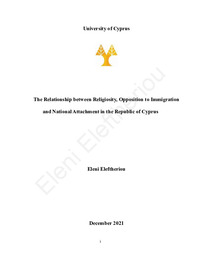The Relationship between religiosity, opposition to immigration and national attachment in the Republic of Cyprus

View/
Date
2021-12-15Author
Eleftheriou, EleniPublisher
Πανεπιστήμιο Κύπρου, Σχολή Κοινωνικών Επιστημών και Επιστημών Αγωγής / University of Cyprus, Faculty of Social Sciences and EducationPlace of publication
CyprusGoogle Scholar check
Keyword(s):
Metadata
Show full item recordAbstract
Immigrants are making up a continuously growing proportion of the European population and the issue of host country population attitudes towards immigrants is a significant social and political one that it is shaped by a number of factors such as sociodemographic variables (e.g. education, gender, political orientation), personal beliefs, cultural values, national identification and the representation of immigrants by media and politicians (Hainmueller & Hopkins, 2014). This study explores the relationship between religiosity and attitudes towards immigrants and the moderating variable of national identity in the Greek Cypriot Community Republic of Cyprus (RoC). This research draws on Social Identity Theory (henceforth SIT) as the foundation for the hypotheses and research questions. The results indicate that Cypriots who hold high level of religiosity, attend to religious services and pray frequently are likely to demonstrate negative attitudes to immigration. On the contrary, the more educated a person is and the more left-orientated politically, the more likely to have more positive attitudes towards immigration. Additionally, this study showed that attachment to Cyprus moderates the relationship between the degree of religiosity, frequency of attendance to religious services, frequency of praying and attitudes towards immigration. The direction of the interaction effects suggested that lower attachment to Cyprus was strengthening the religiosity, church attendance
and frequency of praying link to xenophobic attitudes. The information provided by this study, at the regional level, might be useful to policy makers in terms of which changes should be aimed to reinforce, in order to lessen natives’ negative attitudes towards immigrants and refugees.
